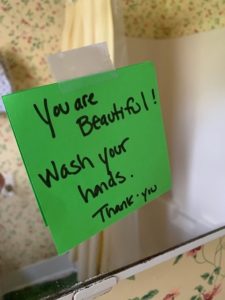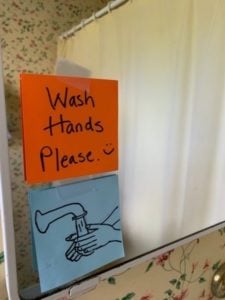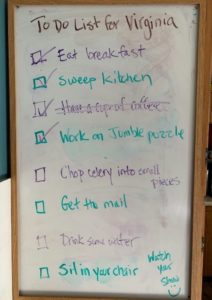Caregiving is not easy at times, and caregiving during a pandemic just adds layers you have never had to deal with before. Our stress levels are a little higher during this time, especially if your Loved One is normally at an Adult Day Center or if you usually have help in your home that you do not have anymore. Some people living with dementia may have an increased risk of the virus due to forgetting to stay six feet away from others, wash their hands, and not touch their face—which are things we should ALL be doing. Here are a few tips and ideas for you to help keep everyone less stressed and more healthy.
For Caregivers:
- You will need to adapt your actions to meet their needs. They are not going to wash their hands more or use sanitizer. Because of this, you need to be creative and find ways to help them.
- Slow down. Take a breath. I believe folks living with dementia have a sixth sense and can pick up on our anxiety and nervousness. Let’s not pass that on to each other.
- Understand that they may not be able to express what they are feeling or hearing you talk about. They may feel scared, which is normal. Watch for non-verbal cues about this so you can help them feel less stressed.
- Try not to get frustrated when they are frustrated.
- I know this is almost impossible right now, but try to find something that gives you happiness in all of this. Even if it is two minutes alone with a Double Stuf Oreo.

For Loved Ones:
- Put up more reminders. This helps everyone. If your loved one is having trouble reading reminders, try drawing a picture.

- Wash hands together and sing together for 20 seconds. We all know “Happy Birthday,” but that could get confusing when your loved one may expect cake after each hand washing. Other songs work, too. There is the refrain from Dolly Parton’s hit “Jolene”:
“Jolene, Jolene, Jolene, Jolene,
I’m begging of you please don’t take my man.
Jolene, Jolene, Jolene, Jolene.
Please don’t take him just because you can.”Or maybe a little from Queen:
“We will, we will rock you (rock you).” Say 3 times.
(Or change to: “We will, we will wash you.”)Or maybe Woody Guthrie:
“This land is your land, this land is my land
From California to the New York island
From the Redwood Forest, to the Gulf Stream waters
This land was made for you and me.” - Make a cool collage from magazines. A food collage or things you think are pretty, or all animals, or whatever.
- Take a walk every day. Just wave at people instead of hugging!
- Ask other family members to send video messages or emails in large font that you can show or print out for your loved one.
- Pick some videos to watch together on the Internet. You can find everything. Your Dad always loved fishing? There are video compilations of the best fishing moments. Laughing babies? Dogs doing funny things? Just Google it.
- Have a To-Do List for you and for your loved one. Think about things the person can still do and have them mark them as they complete each task.

- Bake something and double the recipe. Your loved one can help even if it is handing you ingredients or stirring. Give extra to a neighbor.
- MUSIC! We always have music playing. You can use a music service for free (there will be commercials), but you can make playlists of songs you both like and dance and just have music playing while you are together.
- Send cards or letters to your family. Have your loved one write a note to each family member or at least put the stamp on and seal the envelope. My Mom could always make her trademark XOXOs at the bottom.
About Karen Stobbe-Carter, Chief Purpose Officer, In the Moment
Karen was working as an actress, director, writer, and instructor of theatre when her Dad, Manfred was diagnosed with Alzheimer’s disease. Her life has taken on a new focus and new meaning in combining the knowledge of her two worlds into one life work.
Karen was the co-writer with Sonya Barsness of all the scripts and content for the Hand in Hand Training Toolkit produced by CMS and distributed to every nursing home in the country. She has also worked on curriculum for the National Alzheimer’s Association, as well as the Eden Alternative.
Karen was the Director of Education for Pioneer Network and the Chair for the Annual Conference for 6 years. Karen has presented over 700 workshops, keynotes, and performances. She has written a book, has a training DVD, been on NPR’s This American Life and recently presented at the International TED MED Conference. For more information, please visit www.in-themoment.net.



